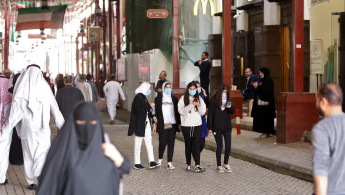Kuwait to impose '150 percent increase' on expat visa fees
The increase of fees will also apply to the renewal of residency permits in the oil-rich country, according to the document, which also details new restrictions on family visas.
Foreigners over the age of 60 will not be granted a residency renewal, the document states, and some non-Kuwaitis in public sector posts will see a reduction in benefits.
Foreigners account for nearly 3.4 million of Kuwait's 4.8 million population. They make up around 70 percent of the country's workforce, with 29 percent working in domestic roles, such as domestic workers and drivers.
Kuwait has been slowly working to replace foreigners with nationals in the workforce. But by the end of 2019, only 19 percent of Kuwaitis were working in the private sector.
Read also: 'You're hired to serve us': Kuwaiti influencer launches vile attack on Egyptians
Earlier this month, Kuwait's Prime Minister Sheikh Sabah Al Khalid Al Sabah said the number of expats should be more than halved to make up only 30 percent of the overall population.
There's a "big imbalance, and we have a future challenge to redress this imbalance", Sheikh Sabah told local media, as his country also sought to diversify its economy away from its 90 percent dependence on oil.
Kuwait's economy has also been shaken by the coronavirus pandemic. The country has imposed one of the strictest lockdowns in the Gulf region, in attempt to curb the spread of the disease.
It has recorded over 35,900 cases of the Covid-19 so far, with 296 deaths.
Kuwait has been treating Covid-19 patients, including non-Kuwaitis, for free. This has triggered calls for expats to be expelled, so that locals can be sure of having a hospital bed if they fall ill.
Anti-expat rhetoric has also been prominent among candidates ahead of parliamentary elections scheduled for later this year.
Follow us on Facebook, Twitter and Instagram to stay connected





 Follow the Middle East's top stories in English at The New Arab on Google News
Follow the Middle East's top stories in English at The New Arab on Google News


